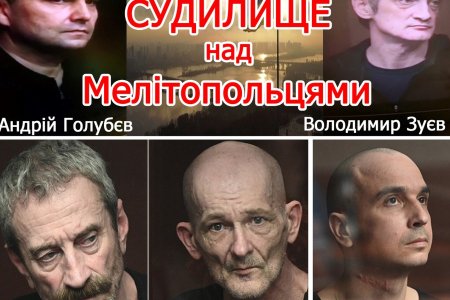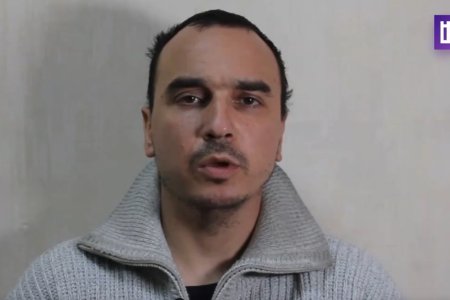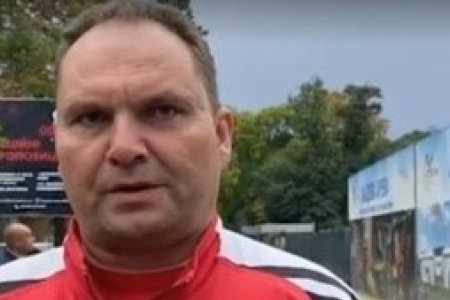
Russia’s Southern District Military Court has passed massive sentences against five Ukrainians abducted from their homes in Melitopol soon after Russia’s full-scale invasion of Ukraine. The court was unperturbed by the lack of any evidence for the surreal ‘international terrorism’ charges against Andriy Holubiev, Ihor Horlov; Yury Petrov, Volodymyr Zuyev and Oleksandr Zhukov aside from ‘confessions’ obtained through torture during the first weeks when the men were held incommunicado.
All of the sentences were for maximum security [‘harsh-regime’] prison colonies, after an unprecedented term of 5.5 years in a prison, the worst of Russian penal institutions, in each man’s case. Ihor Horlov and Yury Petrov were sentenced to 14 years; Andriy Holubiev and Oleksandr Zhukov to 12 years; and Volodymyr Zuyev to 11 years. The sentences were passed by Sergei Mikhailovich Gorelov and two colleagues, with Gorelov having already taken part in other politically-motivated cases.
This was a trial in name alone as it was clear from the outset that ‘guilty verdicts’ and long sentences were inevitable. The men either did not know each other at all, or had had minimal contact before their abduction in early April 2022. It was then that the Russians decided to claim that they had all been members of the same ‘terrorist organization’ planning acts of so-called ‘international terrorism’ on territory occupied by the Russian invaders.
Only Ihor Horlov (b. 1987) was a serving member of Ukraine’s Armed Forces when abducted by the Russians. All of the others were civilians, although Mediazona, reports that three of the men – Andriy Holubiev (b. 1977); Oleksandr Zhukov (b. 1969) and Volodymyr Zuyev (b. 1978) were reservists in Ukraine’s Territorial Defence. Yury Petrov (b. 1961) retired a year before the full-scale invasion, but is a veteran of ‘ATO’ (the ‘anti-terrorist operation’ against Russian-instigated military conflict in Donbas).
The men were all held in a basement in handcuffs and with bags over their heads for two weeks They were beaten and tortured with electric currents to force them into signing ‘confessions’ to planning an attack on a humanitarian aid distribution point Horlov has since described not only the torture he endured, but also his suicide attempts after his torturers threatened to bring in his family and subject them to electric current torture. Mediazona quotes him as saying that since his family was on occupied territory (and therefore in danger), he would have admitted to US President John Kennedy’s assassination (in 1963). It was after several days of being subjected to physical torture himself, as well as to threats that his family would be next, that Horlov tried to kill himself. He was found, and resuscitated, after he succeeded in slashing his throat with a hook. He explains that he had already signed whatever ‘confessions’ were demanded of him, but the torture had continued, with the FSB still convinced he was hiding something.
By 21 April 2022, the FSB were claiming to have ‘thwarted a terrorist attack against Russian soldiers and a humanitarian convoy in Melitopol”. On 22 April, Ihor Horlov was shown on Russian propaganda television ‘confessing’ to having “planned a terrorist attack’ by placing explosives in a car bumper. He is seen staring straight at the camera and appearing to recite something that he has learned off by heart. Other men were also shown on similar videos.
It is important to stress that all such ‘confessions’ extracted during weeks of torture were later retracted. Nor is there any proof that there ever was a plan to blow up a convoy carrying humanitarian supplies. Scepticism is fully warranted given that during the first months of Russia’s full-scale invasion, it was the Russians who, on several occasions, bombed humanitarian aid centres or vehicles, as well as people standing in queues for such aid.
Suspicion is also aroused by Russia’s sudden use of Article 361 of its criminal code, on so-called ‘international terrorism’, a norm introduced in 2016, but not once applied until after Russia’s full-scale invasion of Ukraine. Such ‘an act of international terrorism’ is said to be an explosion, act of arson or other actions, committed outside Russia and jeopardizing the life, health, freedom or inviolability of Russian citizens “for the purpose of violating the peaceful co-existence of states and peoples, or aimed against the interests” of Russia. Since you can be convicted merely because of a supposed “threat to commit such actions”, the FSB can easily improve their ‘crime-fighting statistics’ and Moscow can accuse Ukrainians of its war crimes by claiming that entirely fictitious plans were thwarted.
Here the FSB and then Russian prosecutor accused the five abducted Ukrainian civilians of having planned to detonate a car packed with explosives near a place where humanitarian aid was being issued (or when a vehicle carrying humanitarian aid was passing). It was reported in June 2023 that the prosecution was also claiming that the five men were planning “to use a grenade thrower to shell military technology guarded by Russian military servicemen taking part in the humanitarian action.” The word ‘humanitarian’ here would seem a deliberate ploy aimed at deflecting attention from what, had it genuinely, been planned, would have been an attack on a perfectly legitimate military target.
The men were all charged with planning ‘an act of international terrorism under Articles 361 and 30 § 1 of Russia’s criminal code, as well as of ‘taking part in a terrorist group’ (Article 205.4 § 2).
Had there been any genuine evidence, the FSB would not have held the men incommunicado for months, taking them first to occupied Crimea then to the FSB-controlled Lefortovo Prison in Moscow. There would have also been no reason for suddenly making the ‘trial’ which had dragged on from June 2023 behind closed doors in October 2024.
RIA Melitopol also reports that there were some evident absurdities in the case material. These included a non-functioning car which the prosecution claimed was used to transport explosives, and contradictory testimony. The official ‘witnesses’ were Russian nationals who knew nothing about the case, while the ‘key prosecution witness’ did not know any of the five defendants.
It seems that the alleged ‘terrorist organization’ was the Union of ATO veterans from Melitopol which was headed by Volodymyr Minko. He was also in charge of the Territorial Defence but left the city after Russia’s blitzkrieg invasion and occupation.
Horlov had served in a Ukrainian military unit in Melitopol right up to Russia’s invasion. He knew that this would make him a target and was, therefore, living in hiding. He was, seized by the Russians on 6 April 2022. During the next week, his telephone continued to respond to messages with the invaders presumably using this to try to identify other contacts. He was accused of having prepared the ‘bomb’ and placed it in the car, as well as being involved in “looking for other means of carrying out a crime, organizing hiding places and moving weapons and ammunition to them.
It is now known that Andriy Holubiev, a well-known Kung Fu trainer and a Buddhist since the 1990s, was seized the same day. His wife Olha assumes that he was targeting because he was quite open in expressing his opposition to Russia’s invasion. Oleksandr Zhukov was abducted the following day, 7 April 2022, and Yury Petrov on 8 April. It seems that Volodymyr Zuyev was actually seized first, on 1 April 2022, although this may well have been simply because his brother, Oleksandr, is serving in Ukraine’s Armed Forces.
All of the men are clearly Ukrainian patriots, with the Russian prosecution putting this rather differently. It claimed that their motive for joining the alleged ‘terrorist organization’ had been their opposition to Russia’s occupation. Mediazona notes that “this simple and understandable thought” is stretched out into an entire page in the indictment with the prosecution repeating the propaganda claims about Russia’s euphemistically named ‘special military operation’ [i.e. its war against Ukraine] including the quite surreal assertion that this is aimed at “defending the population of Ukraine against the genocide and ill-treatment from the current Ukrainian leadership.”
The allegedly ‘thwarted act of international terrorism’ was, so the authors of the indictment assert, aimed at “violating the peaceful co-existence of states and peoples” [sic]. Neither the FSB, nor the prosecutor let on where this alleged ‘international terrorism’ was supposed to have been planned.
Russia is officially claiming that all the men were ‘detained’ on 20 April 2022 – more than two weeks after they were abducted and mercilessly tortured to extract ‘confessions’ to the above fabricated ‘international terrorism’ charges.
The men will certainly lodge appeals, and are likely to remain imprisoned in the appalling conditions of Russian SIZO or remand prisons in Rostov oblast.
Please write to one or more of the men!
The letters tell them they are not forgotten and show Moscow that its persecution of innocent men is not going unnoticed. Letters need to be in Russian, and on ‘safe’ subjects. If that is a problem, use the sample letter below (copying it by hand), perhaps adding a picture or photo. Do add a return address so that the men can answer.
Sample letter
Привет,
Желаю Вам крепкого здоровья и надеюсь, Вы скоро вернетесь домой, к своим родным. Простите, что мало пишу – мне трудно писать по-русски, но мы все о Вас помним.
[Hi. I wish you good health and hope that you will soon be home, with your family. I’m sorry that this letter is short – it’s hard for me to write in Russian., but you are not forgotten. ]
Andriy Holubiev
344022 Russian Federation, Rostov on the Don, 219 Maxim Gorky St, SIZO-1
Holubiev, Andriy Yurievich (b. 1977)
Ihor Horlov
344022 Russian Federation, Rostov on the Don, 219 Maxim Gorky St, SIZO-1
Horlov, Ihor Yurievich, b. 1987
Yury Petrov
344022 Russian Federation, Rostov on the Don, 219 Maxim Gorky St, SIZO-1
Petrov, Yury Anatolievich, b. 1961
Oleksandr Zhukov
344064 Russian Federation, Rostov on the Don, 4 Tonnelnaya St, SIZO-5
Zhukov, Aleksandr Anatolievich, b. 1969
Volodymyr Zuyev
344064 Russian Federation, Rostov on the Don, 4 Tonnelnaya St, SIZO-5
Zuyev, Vladimir Aleksandrovich, b. 1978



